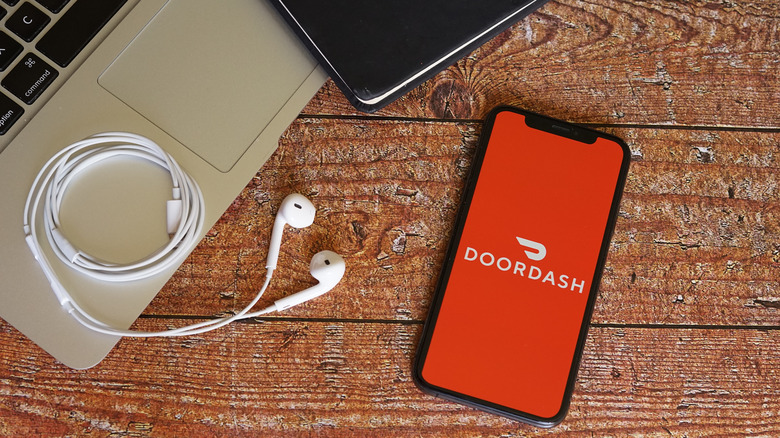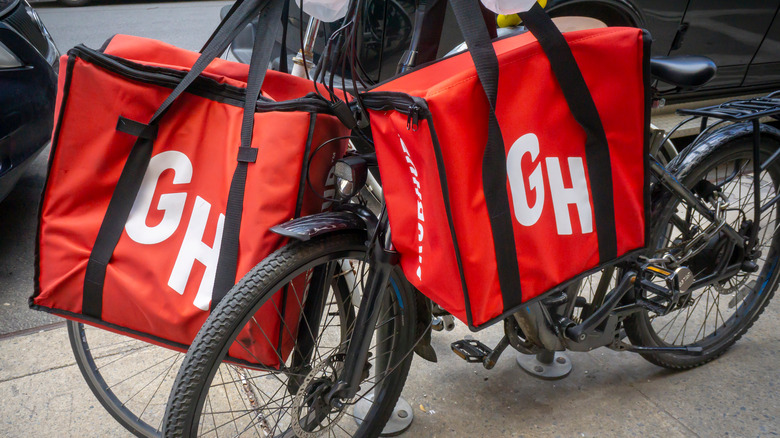Why Chicago Is Suing Grubhub And DoorDash
Food delivery apps have managed to gain significant traction in the past decade. According to Business of Apps, the success has particularly been prevalent over the past five years as "the effects of more delivery riders, alongside route optimization technologies, has enabled faster and cheaper delivery." Not to mention those needing extra side hustle money, as working for these apps allows people to make their own schedules while earning extra income. The influx of activity lately has also largely been sparked by millions of people ordering food on the apps for the first time in 2020 due to the pandemic and the shuttering of eat-in opportunities at restaurants. Among the top ranking of these services, says Business of Apps, is Grubhub and DoorDash.
The article points to the fact that Grubhub was an "original aggregator in the U.S. ... control[ing] over 50% of online food delivery up until 2018," while DoorDash, they note, is "the current leader in online food delivery in the U.S., which also pioneered the platform-to-consumer model." These are clearly two big players in the food delivery game. So, what could these cultural dynamos have done to anger the city of Chicago enough to get them sued?
While the ever popular food delivery services continue to do well in the market, Eater Chicago notes that the city is officially calling out DoorDash and Grubhub for "allegedly scamming basically everyone: restaurants, drivers, and customers" in the pending litigation, filed August 27 in Cook County Circuit Court, with individual lawsuits waged against each behemoth company.
DoorDash and Grubhub are alleged to have scammed restaurants, customers, and the city
As the Eater Chicago article points out, restaurant owners in particular feel they were duped over the past year, with the delivery apps allegedly using "bait-and-switch tactics to fool customers into thinking they'll be paying lower fees compared to what they're ultimately charged" and with restaurants bearing the brunt for covering the costs of the apps' promotions as well as increased commission payouts. Other claims include the companies allegedly "using consumer tips to pay itself rather than its drivers" and adding a "Chicago fee," which seemed to come from the city itself, but was really a way for the apps to reap more earnings. As well, there is also the grievance that restaurants were added to the portals without the owners' knowledge or consent.
These comprehensive lawsuits, steered by Chicago Mayor Lori Lightfoot, are among the first of their kind and novel in combining all the allegations in one suit, according to the Eater article — and restaurant owners are happy the city is working on their behalf to rectify the situation.
"This is how restaurants have been feeling for longer than the last 18 months," Scott Weiner, co-owner of the Fifty/50 Restaurant Group, told Eater Chicago. "It feels a little [vindicating] to read and to hear that finally, after a lengthy investigation, that we're right. They've ruined us. We've been taken advantage of."
Both companies issued statements denying the claims with DoorDash saying, "This lawsuit is baseless. It is a waste of taxpayer resources, and Chicagoans should be outraged. DoorDash has stood with the City of Chicago throughout the pandemic, waiving fees for restaurants, providing $500,000 in direct grants, creating strong earning opportunities, and delivering food and other necessities to communities in need."
In terms of what the lawsuit seeks, the filing suggests "$2,000 to $10,000 for every offense or party harmed," according to Eater, and "the city also wants the companies 'disgorge' any profits made due to any alleged violations." Each company has 30 days to respond before the cases move forward in the court system.

